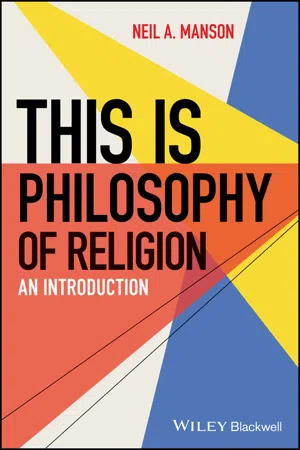
- English
- ePUB (mobile friendly)
- Available on iOS & Android
About this book
A reader-friendly introduction to the essential concepts, theories, and questions in analytic philosophy of religion
Does God exist? If so, what is God's relationship to us? Do we have free will? This is Philosophy of Religion surveys foundational topics in the philosophy of religion using a clear and accessible style. Straightforward and easy to comprehend for those with no prior philosophical background, this engaging introduction familiarizes readers with the vocabulary, methods, and major concepts in the philosophy of religion, and invites them to think through questions which arise in the intersection of philosophy, theology, and religious studies. Part of the popular This is Philosophy series, this book applies the basic investigative methods of philosophy to questions of religion, faith, and morality.
Chapters offer a framework for thinking about religion, present arguments for and against the existence of God, discuss religious diversity, consider the intellectual co-existence of faith and reason, and examine different theories about why people are religious. Examples and illustrations taken from popular culture reinforce the subject's contemporary relevance, and are complemented by a wealth of online resources for instructors on the This is Philosophy series site that encourage further reading and strengthen student comprehension of key concepts.
A dependable introduction to the philosophy of religion, This is Philosophy of Religion is an ideal gateway to the discipline for readers who want to engage with questions about religion and contemplate the philosophical implications of religious belief.
Frequently asked questions
- Essential is ideal for learners and professionals who enjoy exploring a wide range of subjects. Access the Essential Library with 800,000+ trusted titles and best-sellers across business, personal growth, and the humanities. Includes unlimited reading time and Standard Read Aloud voice.
- Complete: Perfect for advanced learners and researchers needing full, unrestricted access. Unlock 1.4M+ books across hundreds of subjects, including academic and specialized titles. The Complete Plan also includes advanced features like Premium Read Aloud and Research Assistant.
Please note we cannot support devices running on iOS 13 and Android 7 or earlier. Learn more about using the app.
Information
1
WHAT IS PHILOSOPHY? WHAT IS RELIGION?
1.1 What Philosophy Is
1.2 Basic Tools of Philosophy: Logic and Analysis
1.2.1 Propositions and Their Qualities
1.2.1.1 The Relationships Between Propositions
1.2.1.2 Modal Propositions
1.2.1.3 A Priori and A Posteriori Propositions
Table of contents
- Cover
- Series page
- Title page
- Copyright
- Table of Contents
- Acknowledgments
- An Introduction to This Is Philosophy of Religion
- Chapter 1: What is Philosophy? What is Religion?
- Chapter 2: The Concept of God
- Chapter 3: The Ontological and Cosmological Arguments for the Existence of God
- Chapter 4: The Design Argument for the Existence of God
- Chapter 5: Atheism, the Problem of Evil, and the Problem of Religious Diversity
- Chapter 6: Epistemology and Religious Belief
- Chapter 7: Naturalistic Explanations of Religion
- Postscript: Buddhism and the Enduring Mystery of Religion
- Glossary
- Index
- End User License Agreement